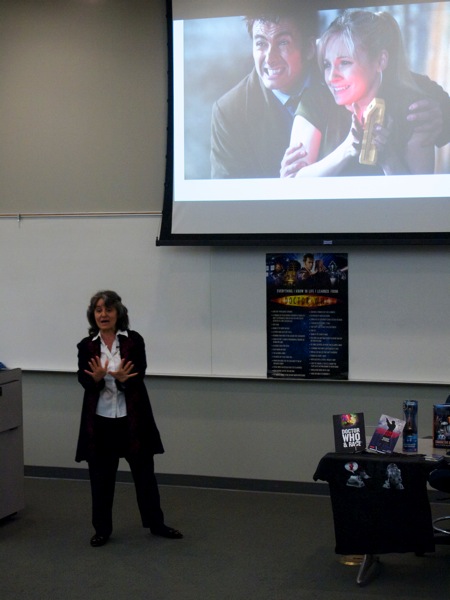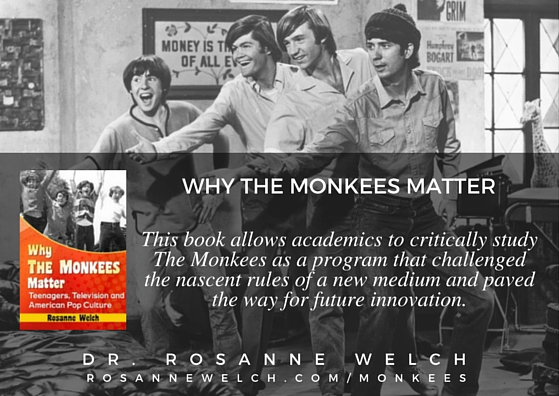from Why The Monkees Mattered by Dr. Rosanne Welch — Coming Fall 2016 – Click for more info!
Writing, Film, Television and More!
It is always fun to work with student journalists – this is a story written by one from CalPoly Pomona about the 4 volume encyclopedia my colleague Peg Lamphier and I co-edited for ABC-CLIO over the last three years – it is now available for pre-order by high school and college libraries (and any individuals who like to college encyclopedias or books about cool women!)
Professors Give American Women Their Own Historic Focus | PolyCentric | Carly Owens
There’s a proverb that says “women hold up half the sky,” a centuries-old homage to the vital role women play.
Cal Poly Pomona Professors Rosanne Welch and Peg Lamphier have compiled those historic feats in a new encyclopedia titled “Women in American History.”
The four-volume set covers pre-colonial history to modern-day feminism.
“It’s women in American history and culture, so we thought about what kind of women don’t normally get into encyclopedias to ensure there was a great diversity expressed,” says Welch, who holds a doctorate in American social history of the 21st century.
Some women who are included in the compilation are ones people may not expect to see in an encyclopedia.
“Lady Gaga hasn’t made many encyclopedias, but her philanthropy and influence on media earned her a place in the book,” Welch says.
This will be all over the internet in a minute – but I wanted so share it here for the folks who have enjoyed so many of my Doctor Who lecture videos.
“Television forced families to see things they might not have chosen to see, but needed to see, such as independent women, people of color and new political perspectives. All these things appeared on The Monkees long before the rise of social commentary comedies such as All in the Family.”
from Why The Monkees Mattered by Dr. Rosanne Welch — Coming Fall 2016 – Click for more info!
Dr. Rosanne Welch presents “How Doctor Who Redefined Masculinity: A Study of the Doctors and their Male Companions“ at the Cal Poly Pomona University Library. Dr. Welch teaches in the IGE (Interdisciplinary General Education) program.
Watch the entire presentation here
Transcript:
That leaves me with wondering, of all The Doctors who is the manliest man? I think it’s an interesting thing to ponder. We’re critically thinking about our media and what messages is our media sending us. Who do we bond with? Who do we think’s the best? I’ll tell you. None of them. Why can’t any of them be the manliest man? They aren’t men. They’re aren’t human. They’re Timelords. None of them can be the manliest man. All right. They’re all Timelords. However, I’m very interested in the actual men who have appeared on the show. So from that group. who do we think defines masculinity in the modern world best?
Student: “Is it Rory?
Ooo, why?
Student: “Because he’s a family man”
He does it all! He’s a family man, but he’s also a warrior and a protector and he’s a good dad to both the baby and to the grownup River, who he didn’t get a chance to know. Imagine – that’s like an adoption story, where you meet your child when they’re a grownup and how do you make a relationship with someone who you didn’t share any time with. You’ve got to start from scratch and that’s exactly what he has to do with River Song. It’s a very modern story. In the days before, when you never opened adoption paperwork and you couldn’t know that. So, I think that Rory is a very modern guy. And a very manly man. He was good pirate, too. When he had to be.
A clip from this 5th talk on various aspects of Doctor Who presented by Dr. Welch. You can find Dr. Welch’s other Doctor Who talks using the links below.

Follow Dr. Rosanne Welch on the Web and via social media at:
Podcast: Play in new window | Download
Subscribe: RSS
Why The Monkees Matter: 9 Theme(s) from The Monkees: Narrative Structure, Literary References and Themes on The Monkees
from Why The Monkees Mattered by Dr. Rosanne Welch — Coming Fall 2016 – Click for more info!
Who Wrote The Monkees? – “Monkees At The Circus” by David Panich – Part 6 of an on-going series
David Panich wrote Monkees at the Circus as one of only a few freelancers contracted for the series and was also on the staff 1967 of writers who won the Emmy Award for Outstanding Writing Achievement in a Music or Variety show for his work on Laugh-In, a show that took a page from The Monkees by bringing the counter-culture into more and more homes in that era.
The other Monkees freelancer who shared the Emmy with Panich was Coslough Johnson.
Likewise, Panich had been nominated for the same Writing award but for a different show and with a different future Monkees writer – Gerald Gardner – when they both worked on That Was the Week That Was. This is likely where Gardner knew of Panich and why Panish was invited to pitch ideas for The Monkees. He would be nominated for Laugh-in three more years in a row, and then receive a writing nomination in 1975 for his work on Cher, the show she headlined after her divorce from Sonny. A seasoned variety show sketch writer Panich had also written for The Dean Martin Show, and would later work for the Hudson Brothers and Dom DeLuise. Sadly, Panish died in 1983.
More information on The Monkees:
Previously in Who Wrote The Monkees?:

“This book allows academics to critically study The Monkees as a program that challenged the nascent rules of a new medium and paved the way for future innovation.”
from Why The Monkees Mattered by Dr. Rosanne Welch — Coming Fall 2016 – Click for more info!
Dr. Rosanne Welch presents “How Doctor Who Redefined Masculinity: A Study of the Doctors and their Male Companions“ at the Cal Poly Pomona University Library. Dr. Welch teaches in the IGE (Interdisciplinary General Education) program.
Watch the entire presentation here
Transcript:
We learn that he has a daughter. So in the modern Who, the military person is Kate Lethbridge-Stewart, his daughter. So. she’s inherited her father’s job, if you will. She’s a science officer more than a military officer with UNIT, which is the group that takes care of all of that. So, we meet Kate and when we get to Death in Heaven the problem is all the corpses have been turned into Cybermen and their all rising out of the cemetery and, at a certain point, we lose Kate — they toss her out of an airplane, so we know she’s dead, right? Because she hit the ground, splat, she’s dead. Except among all the corpses we’ve been reminded is her father who has been turned into a Cyberman and when we go to that point in the episode we find out that she’s still walking around the cemetery. She hasn’t been harmed, because she never went splat. He caught her and brought her to the ground safely. He protected his child all the way to the end and then he went up to heaven with Danny. Danny pulled all the Cybermen out and it’s The Doctor — never salutes because he doesn’t like the military — but for this act — the act of saving his child, he’s going to salute and I think that speaks to what The Doctor thinks about what makes a man a man. And again, it’s all tied into being part of a family.
A clip from this 5th talk on various aspects of Doctor Who presented by Dr. Welch. You can find Dr. Welch’s other Doctor Who talks using the links below.

Follow Dr. Rosanne Welch on the Web and via social media at:
Podcast: Play in new window | Download
Subscribe: RSS

During the intermission at TedXCPP last week, I was interviewed by a student reporter for The Poly Post, Cal Poly Pomona’s Student Newspaper. Here are some of my quotes from the article, TEDXCPP explores ripple” that appeared on Tuesday, April 12, 2016.
“The first speaker of the night was Rosanne Welch, who started her professional career as a television writer and producer and now teaches several courses across multiple college campuses including CPP. Her talk, titled “The Importance of Having a Woman’s Voice in the Room,” advocated for the importance of a woman’s perspective in screenwriting.
“I disliked not being able to teach girls girl stories,” said Welch. “I never understood the logic to that; I still don’t.”
Welch’s talk did not just speak to women. She emphasized the importance of allowing young boys to admire females and males in order to give them a well-rounded human experience.
“It’s hard to have two audiences,” said Welch. “But I wanted to remind women they have to learn to speak up, and I wanted to remind grown ups that boys aren’t afraid of that.”